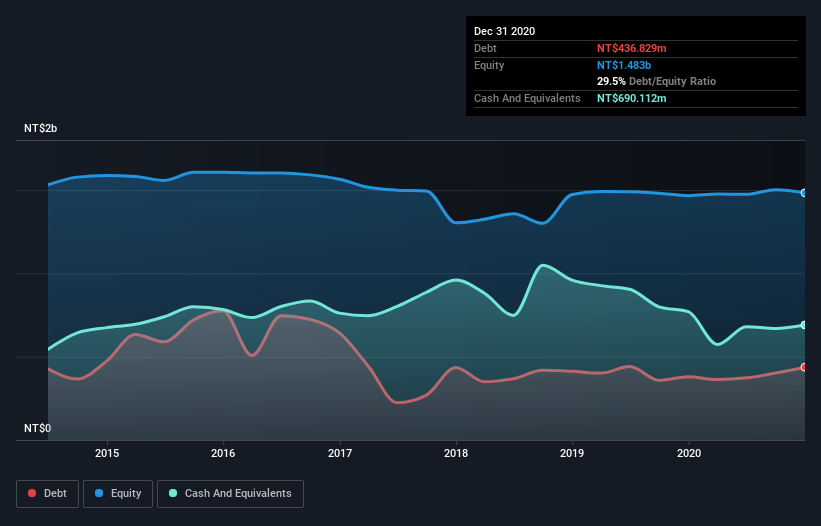Howard Marks put it nicely when he said that, rather than worrying about share price volatility, 'The possibility of permanent loss is the risk I worry about... and every practical investor I know worries about.' So it seems the smart money knows that debt - which is usually involved in bankruptcies - is a very important factor, when you assess how risky a company is. Importantly, Billion Electric Co., Ltd. (TPE:3027) does carry debt. But the real question is whether this debt is making the company risky.
When Is Debt Dangerous?
Generally speaking, debt only becomes a real problem when a company can't easily pay it off, either by raising capital or with its own cash flow. Ultimately, if the company can't fulfill its legal obligations to repay debt, shareholders could walk away with nothing. However, a more common (but still painful) scenario is that it has to raise new equity capital at a low price, thus permanently diluting shareholders. By replacing dilution, though, debt can be an extremely good tool for businesses that need capital to invest in growth at high rates of return. The first step when considering a company's debt levels is to consider its cash and debt together.
View our latest analysis for Billion Electric
How Much Debt Does Billion Electric Carry?
You can click the graphic below for the historical numbers, but it shows that as of December 2020 Billion Electric had NT$436.8m of debt, an increase on NT$379.9m, over one year. But on the other hand it also has NT$690.1m in cash, leading to a NT$253.3m net cash position.

How Healthy Is Billion Electric's Balance Sheet?
According to the last reported balance sheet, Billion Electric had liabilities of NT$760.9m due within 12 months, and liabilities of NT$204.7m due beyond 12 months. On the other hand, it had cash of NT$690.1m and NT$139.7m worth of receivables due within a year. So its liabilities total NT$135.8m more than the combination of its cash and short-term receivables.
Given Billion Electric has a market capitalization of NT$2.94b, it's hard to believe these liabilities pose much threat. Having said that, it's clear that we should continue to monitor its balance sheet, lest it change for the worse. While it does have liabilities worth noting, Billion Electric also has more cash than debt, so we're pretty confident it can manage its debt safely.
Although Billion Electric made a loss at the EBIT level, last year, it was also good to see that it generated NT$39m in EBIT over the last twelve months. The balance sheet is clearly the area to focus on when you are analysing debt. But it is Billion Electric's earnings that will influence how the balance sheet holds up in the future. So when considering debt, it's definitely worth looking at the earnings trend. Click here for an interactive snapshot.
Finally, while the tax-man may adore accounting profits, lenders only accept cold hard cash. Billion Electric may have net cash on the balance sheet, but it is still interesting to look at how well the business converts its earnings before interest and tax (EBIT) to free cash flow, because that will influence both its need for, and its capacity to manage debt. Over the last year, Billion Electric saw substantial negative free cash flow, in total. While investors are no doubt expecting a reversal of that situation in due course, it clearly does mean its use of debt is more risky.
Summing up
While it is always sensible to look at a company's total liabilities, it is very reassuring that Billion Electric has NT$253.3m in net cash. So we are not troubled with Billion Electric's debt use. When analysing debt levels, the balance sheet is the obvious place to start. But ultimately, every company can contain risks that exist outside of the balance sheet. Be aware that Billion Electric is showing 2 warning signs in our investment analysis , you should know about...
At the end of the day, it's often better to focus on companies that are free from net debt. You can access our special list of such companies (all with a track record of profit growth). It's free.
If you’re looking to trade a wide range of investments, open an account with the lowest-cost* platform trusted by professionals, Interactive Brokers. Their clients from over 200 countries and territories trade stocks, options, futures, forex, bonds and funds worldwide from a single integrated account. Promoted
Valuation is complex, but we're here to simplify it.
Discover if Billion Electric might be undervalued or overvalued with our detailed analysis, featuring fair value estimates, potential risks, dividends, insider trades, and its financial condition.
Access Free AnalysisThis article by Simply Wall St is general in nature. It does not constitute a recommendation to buy or sell any stock, and does not take account of your objectives, or your financial situation. We aim to bring you long-term focused analysis driven by fundamental data. Note that our analysis may not factor in the latest price-sensitive company announcements or qualitative material. Simply Wall St has no position in any stocks mentioned.
*Interactive Brokers Rated Lowest Cost Broker by StockBrokers.com Annual Online Review 2020
Have feedback on this article? Concerned about the content? Get in touch with us directly. Alternatively, email editorial-team (at) simplywallst.com.
About TWSE:3027
Billion Electric
Engages in networking and communication, and power and energy management businesses in Taiwan, the United States, Asia, Europe, Oceania, and Africa.
Flawless balance sheet and good value.
Market Insights
Community Narratives



